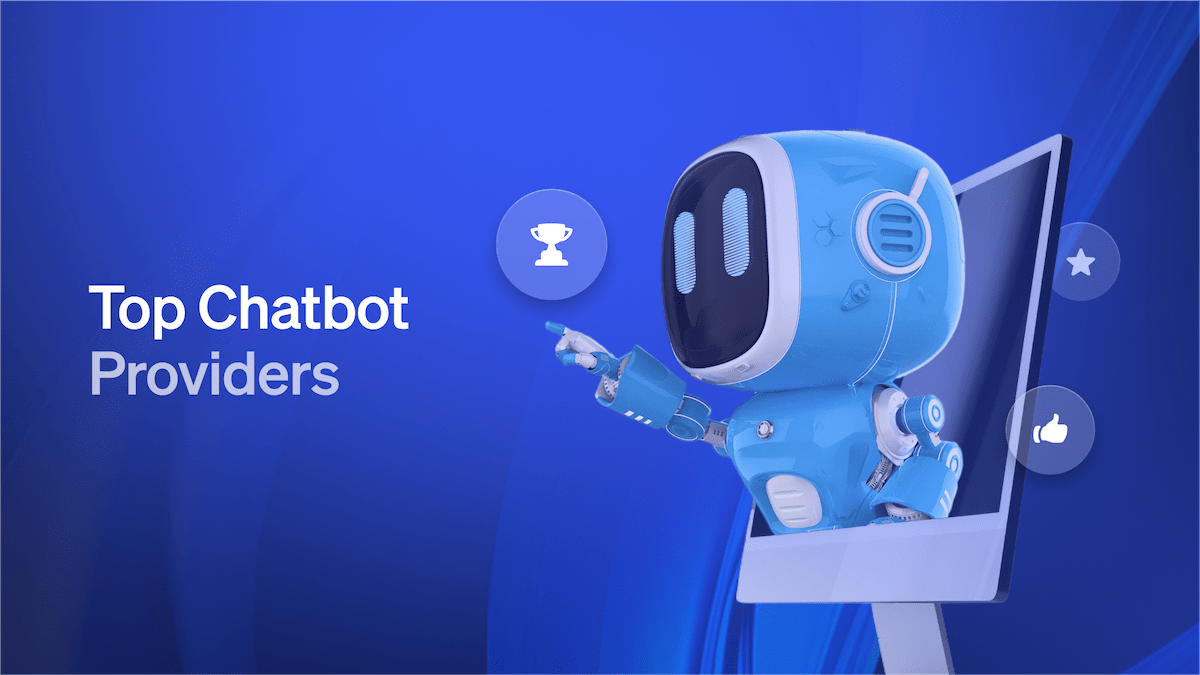If you tried to manage all your customer communication by hand, things would eventually break. Messages might go unanswered for days or, worse, be missed. You’ll need to hire many agents to keep up with inquiries, increasing overhead costs and risking burnout.
That’s why your contact center solution needs chatbot functionality. It helps manage inbound conversations, speed up outbound campaigns, and reduce agent burnout.
In this article, we’ll discuss the top chatbot providers for small businesses, how to choose, and some unconventional ways to use your chatbot software to drive value for your business.
Learn how chatbots boost CSAT & revenue
Watch this free on-demand webinar to learn how to scale service and drive growth with AI-powered chat.
The Top 5 Chatbot Providers
Here’s a quick look at the top chatbots for small businesses.
| Chatbot Provider | Top Features | Monthly Pricing |
|---|---|---|
| Nextiva | – Multilingual support – Customizable automation – Omnichannel deployment | Starts at $15 per user |
| Intercom | – Customer segmentation – Targeted messaging – Customer life cycle management | Starts at $39 per user |
| Zendesk | – Automated routing – AI content generation – Multilingual support | Starts at $19 per user |
| Drift | – Geo-targeting – Offline access – Conversational AI | Starts at $2,500 per month (billed annually) |
| Freshchat | – Cross-channel support – Intelligent ticket assignment – Omni-routing | Starts at $15 per user/month |
1. Nextiva
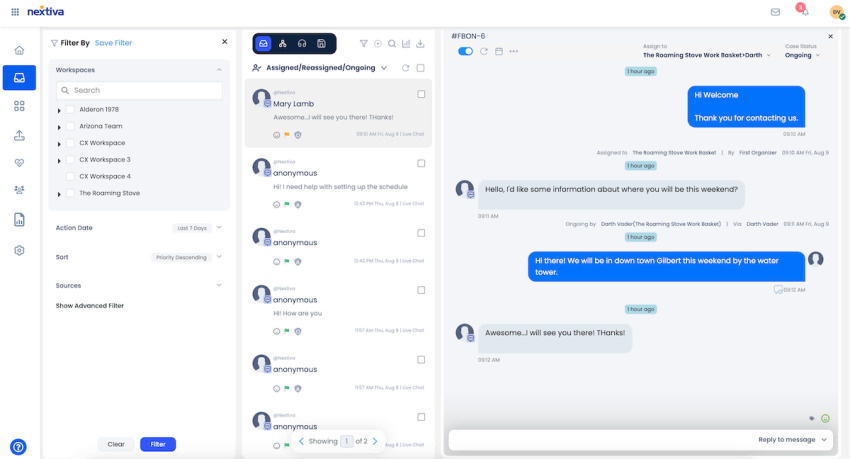
Nextiva’s AI chatbot is the best choice for businesses looking to deliver humanlike personalized sales and support at scale. You can integrate it into different touch points, including your website, social media platforms like Instagram, and instant messaging applications like WhatsApp and Facebook Messenger.
Our chatbot is self-learning, so its performance improves with every conversation. This allows it to personalize customer interactions better and improve their experiences. Other benefits include:
- Reduced costs
- Improved customer satisfaction scores
- Faster response times
- 24/7 customer support
- Increased digital deflection rates
Top features
- Easy-to-set-up workflows
- Customizable automations
- Omnichannel deployment
Pricing
The AI chatbot is part of Nextiva’s unified customer experience management platform. You can subscribe to it by choosing one of the two pricing plans (billed annually):
- Core: $15 per user/month
- Engage: $25 per user/month
- Power Suite CX: $75 per user/month
2. Intercom
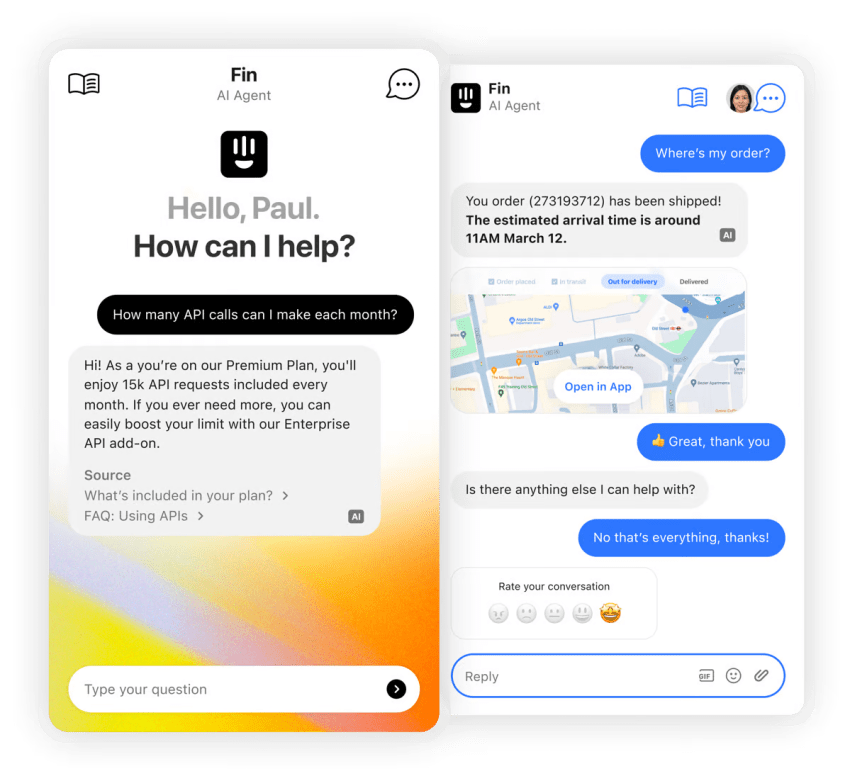
Intercom’s chatbot helps support teams reduce customer wait times and speed up resolution. It provides conversational responses to customer inquiries based on your knowledge base, boasting speed and accuracy. One of the unique aspects of Intercom is an AI-powered support agent (Fin) that costs $0.99 per resolution.
However, some users say it’s not great with omnichannel communication. For example, it can’t identify and merge multiple tickets from the same customer to better streamline your support operations.
Top features
- Customer segmentation
- Targeted messaging
- Customer life cycle management
- Integrations with numerous platforms
Pricing
Intercom offers three paid plans:
- Essential: $39 per seat/month
- Advanced: $99 per seat/month
- Expert: $139 per seat/month
3. Zendesk
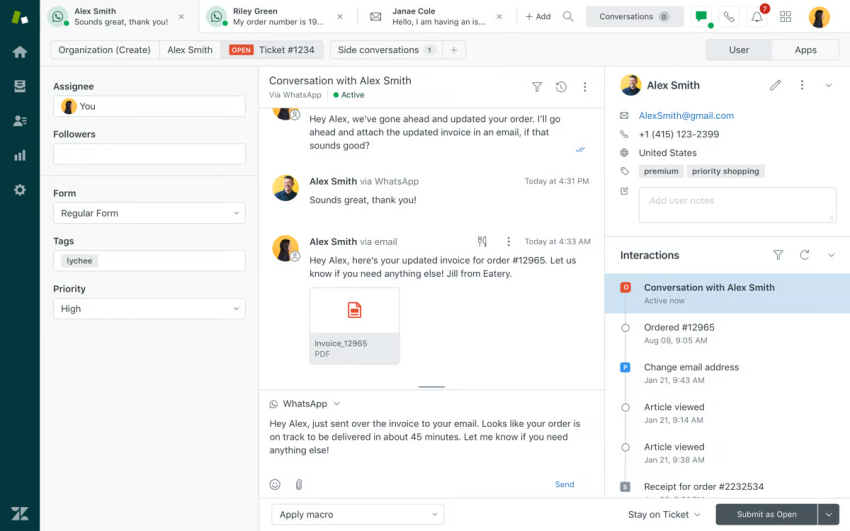
Zendesk’s AI agents integrate seamlessly with its help desk and ticketing system, providing a unified customer support experience. This makes it a decent choice for businesses looking for an all-in-one customer service platform.
Due to its many features and complex functionalities, Zendesk can be overwhelming for new users, especially if you don’t have a technical background. Also, some users say its support team has a slow response time. It can take weeks to get a reply, and the answer is not always helpful.
Top features
- Automated call routing
- AI content generation
- Multilingual support
Pricing
- Build Your Own Plan: $19/month
- Suite Team: $55 per user/month
- Suite Growth: $89 per user/month
- Suite Professional: $115 per user/month
- Suite Enterprise: Contact Sales for pricing
4. Drift
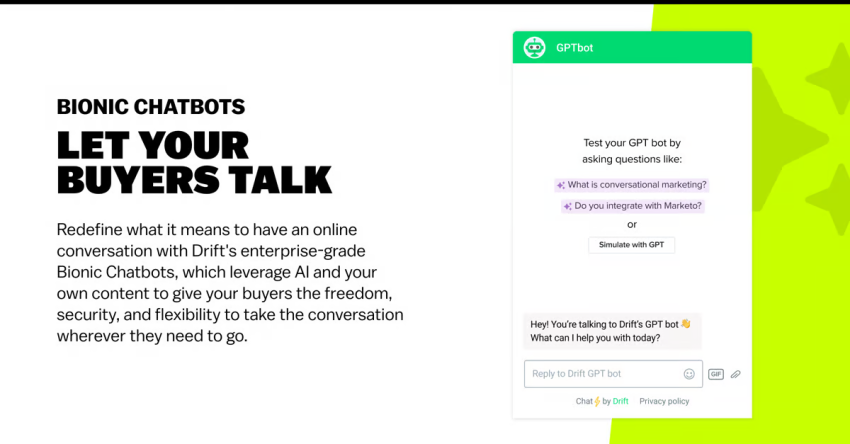
Drift is one of the top choices for businesses looking to scale conversational marketing. Its AI chatbot generates conversation, making it easy for your sales and marketing teams to quickly engage with leads and prospects at different touch points and convert them into customers.
However, the chatbot sometimes generates low-quality conversations that affect how your business interacts with prospects. Also, the tool has a significant learning curve, which affects how quickly you can get value from it.
Top features
- Geo-targeting
- Offline access
- Proactive chatting
Pricing
- Premium: $2,500 per month (billed annually)
- Advanced: Contact Sales
- Enterprise: Contact Sales
5. Freshchat
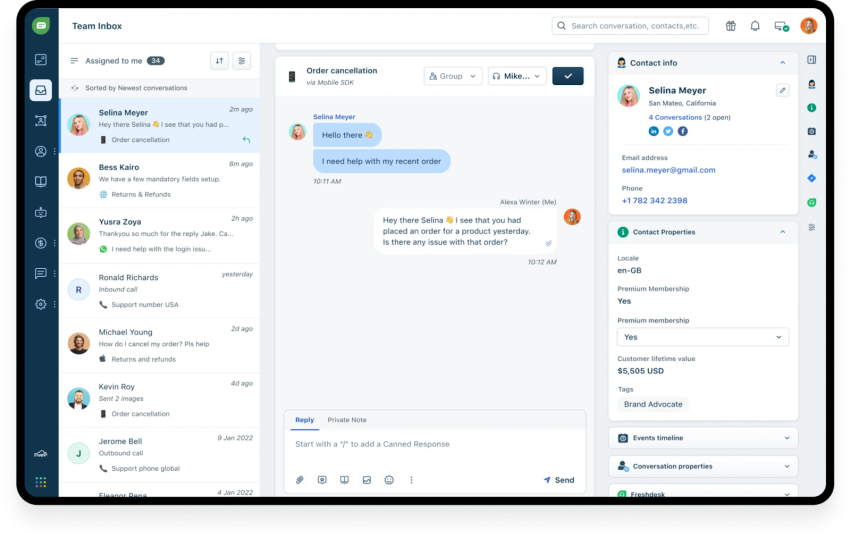
Freshchat is a modern messaging software built for sales and customer engagement teams to talk to prospects and customers on the website, mobile app, and social pages. It offers a range of features, such as AI-powered chatbots, co-browsing, and integrations with other tools, to streamline customer communications and improve user experience.
It’s a popular option for businesses looking to unify communication and customer engagement across multiple channels. However, the platform can be extremely buggy and display incorrect support data.
Top features
- Cross-channel support
- Intelligent ticket assignment
- Omni-routing
Pricing
The maker of Freshchat, Freshworks, has a free plan for up to 10 agents. It also has three paid plans:
- Growth: $15 per agent/month
- Pro: $49 per agent/month
- Enterprise: $79 per agent/month
Key Features To Look For in a Chatbot Provider
With so many chatbot providers, it can be hard to make a choice. Here are the most important things to look out for as you vet available options.
Natural language processing
The chatbot must understand human language in context and respond appropriately. It should be able to interpret common phrases, make sense of abbreviations and colloquialisms, and respond in a clear and helpful manner. It should feel like the customer is chatting with a human.
For example, let’s say a customer reaches out with the following inquiry: “Hey! Why’s my order taking so long?” A chatbot with natural language processing capabilities will understand that this is an order status inquiry and that the customer is frustrated about the delay.
Based on this context, it can respond with empathy like a human would. For example, it might say, “I’m sorry to hear your order is delayed. Give me a few minutes to confirm the status for you. Could you please provide your order number?”
This makes for a smoother interaction and faster issue resolution.
Integration capabilities
A good chatbot should seamlessly connect with the other tools used in your contact center, such as CRM software like Salesforce and customer data platforms. This has two main benefits:
- The chatbot can access information from multiple data sources to provide more contextual responses to customers and prospects.
- It makes your contact center more efficient. For instance, a chatbot integrated with a customer support ticketing system can directly create tickets for customer queries, saving time for support agents and improving response times.
Related: Customer Support Chatbots: Key Features, Use Cases, & More
Customization options
Opt for a white-label chatbot software that you can customize to match your brand and contact center setup. At the very least, you should be able to add your brand colors and theme to the software to make it look like a native application unique to your business.
Advanced chatbot solutions like Nextiva also allow you to:
- Add a welcome message to the chat display for customers
- Automatically administer pre- and post-chat surveys
- Set up offline hours to match your contact center schedule
Multichannel support
Choose a chatbot tool that you can integrate into all your communication channels — from your website to social media and email.
That way, you ensure that you handle every customer interaction consistently and efficiently, no matter which platform they’re using to contact you. The goal is to avoid missing or neglecting any customer inquiries simply because they come through less automated or manual channels.
In addition, multichannel support allows the chatbot to gather and utilize data from diverse sources, leading to a more holistic understanding of customer needs and better personalization.
Related: 6 Best Practices for Implementing a Call Center Chatbot
Nifty Campaign Ideas for Your Chatbot
Live chat software isn’t solely for responding to customer inquiries. It can create value across your entire sales, marketing, and customer experience strategy.
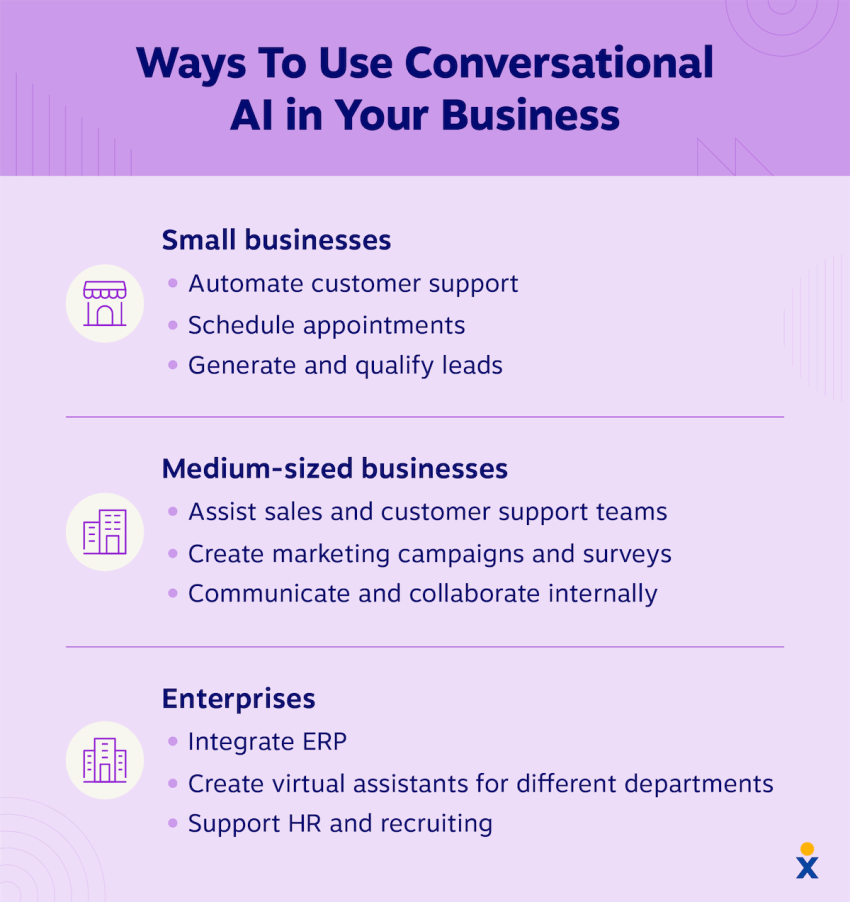
1. Appointment booking
You can integrate your live chat software with a scheduler to manage appointment bookings efficiently. This saves the time your agent would have spent managing this process manually.
Customers or prospects can easily inquire about availability, book or make changes to existing appointments, and ask questions about the booking process without picking up the phone or sending an email. Once an appointment is scheduled through the live chat, the customer can receive instant confirmation and details, which reduces any uncertainty or back-and-forth.
2. Feedback collection
You can integrate chatbots into customer communication channels like your website and social channels, and gather real-time customer feedback after every interaction.
Nextiva, for example, allows you to integrate pre-chat and post-chat surveys into your chatbot software. You can collect valuable insights to better understand the customer’s issues before the conversation to speed up resolution. Once it’s resolved, you can ask open-ended questions to determine whether the customer is happy with their experience.
Customer feedback can also inform contact center improvements. For example, imagine the customer was unhappy with the quality of the response. In that case, you can improve your knowledge base documentation so that the AI pulls from more relevant data in the future.
3. Product recommendations
Chatbots can provide personalized product recommendations based on customer interactions, helping your sales team close more deals.
For example, let’s say a customer fills out a pre-chat questionnaire indicating what they’re looking for. The chatbot can crossmatch the request with your catalog and recommend the best-fit products. It can also suggest products based on customer preferences and purchase history.
4. Customer service
Nearly 80% of customers expect a brand/product to have self-service options over traditional customer service channels. A chatbot can help you meet this expectation.
It allows customers to quickly resolve issues independently instead of waiting for a response from a human agent. You can also integrate the chatbot into your knowledge base so that it shares relevant help resources based on the customer’s inquiry.
Related: Chatbots for Customer Service: Strategies & Tips to Grow Customer Satisfaction
Streamline Your Customer Conversations in a Single Platform
You’ll get the most value from a chatbot that easily syncs with the rest of the software used to run your contact center. That way, you can have a 360-degree view of business interactions, from prospects to customers.

As a unified communications platform, Nextiva excels in customer service and lead generation functions. It centralizes all customer conversations into a single platform, allowing you to personalize sales and support at scale.
Learn more about how our customer journey orchestration tools can transform your business from the inside out.


















 Customer Experience
Customer Experience 

